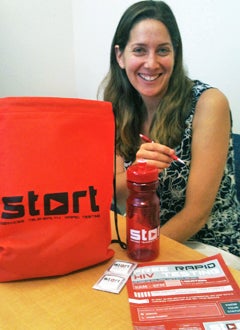 Thanks to a three year service grant awarded by the Substance Abuse and Mental Health Services Administration (SAMSA) and CSUN’s status as a Hispanic-Serving Institution, Bethany Rainisch has developed a partnership with Tarzana Treatment Centers to reduce the incidence of HIV in the community.
Thanks to a three year service grant awarded by the Substance Abuse and Mental Health Services Administration (SAMSA) and CSUN’s status as a Hispanic-Serving Institution, Bethany Rainisch has developed a partnership with Tarzana Treatment Centers to reduce the incidence of HIV in the community.
“Tarzana Treatment Centers have been a long-time community partner,” Rainisch said. For this project, we worked together behind the scenes for the first year collecting data, doing a needs-assessment, and planning. We took surveys at CSUN and Pierce College asking students what they knew about HIV and whether they felt it would be beneficial to know their status. And we asked what would make them more likely to get tested,” Rainisch said. “There were a lot of students who didn’t know where to start. They would if they knew where to go, they’d be likely to get tested. So with our program, there is a place to START.”
“The CSUN Klotz Student Health Center has offered rapid testing on a limited scale in the past, but with this grant and Tarzana Treatment Center's partnership we can make the rapid testing available to more students and really get the word out there.”
To get the free testing, CSUN students can log in to the portal online or stop by the Student Health Center and use a computer. A simple oral swab test brings results in 20 minutes, and it’s free. When results are ready, the student speaks with a counselor. “Any Monday students can have an appointment to get the test. Certified counselors are there from nine to four every Monday to perform the test and help students with the results, and so far the turnout has been very good. Students want to know their status.”
START is getting the word out fast. “You may have seen students on campus with our red backpacks with the START logo on them,” Rainisch said. “Inside those swag bags are a water bottle, pens, flyers about the testing, and of course, condoms and lube.” The logo, with a “start” button in the center of the word, is the work of a CSUN Art student; and the flyers were made with the help of the CSUN Center for Visual Communication (VISCOM)."
“We’re marketing the testing in a light hearted way even though we are talking about a serious issue, Rainisch said. "We don’t want to focus on scare tactics or throwing statistics at students. We simply want to make services accessible.”
While the number of students who have been tested is still relatively low, as the word travels more students are helping each other take the step to get tested. Testing is not anonymous, but it is confidential. “We are not seeing a high positive-test rate; thus far all have been negative,” Rainisch said. “Of course as more students take advantage of the program we may find more positives, we hope that isn’t the case but should it be we can quickly connect students with the services they will need to live in the best health possible."
“And that is an important distinction about our work. The focus of the grant is not about finding out who is positive and who is negative, it’s about letting students know why they should get tested, that it’s a normal thing to know about, and that getting tested is a part of life,” Rainisch said. “At the beginning of this, students told us that having an open communication with sexual partners is important. By making services available, we are increasing likelihood of testing and making the concept even more within the norm. We’re saying be proactive, know who you are, know your status.”
Jean O'Sullivan
F2014
